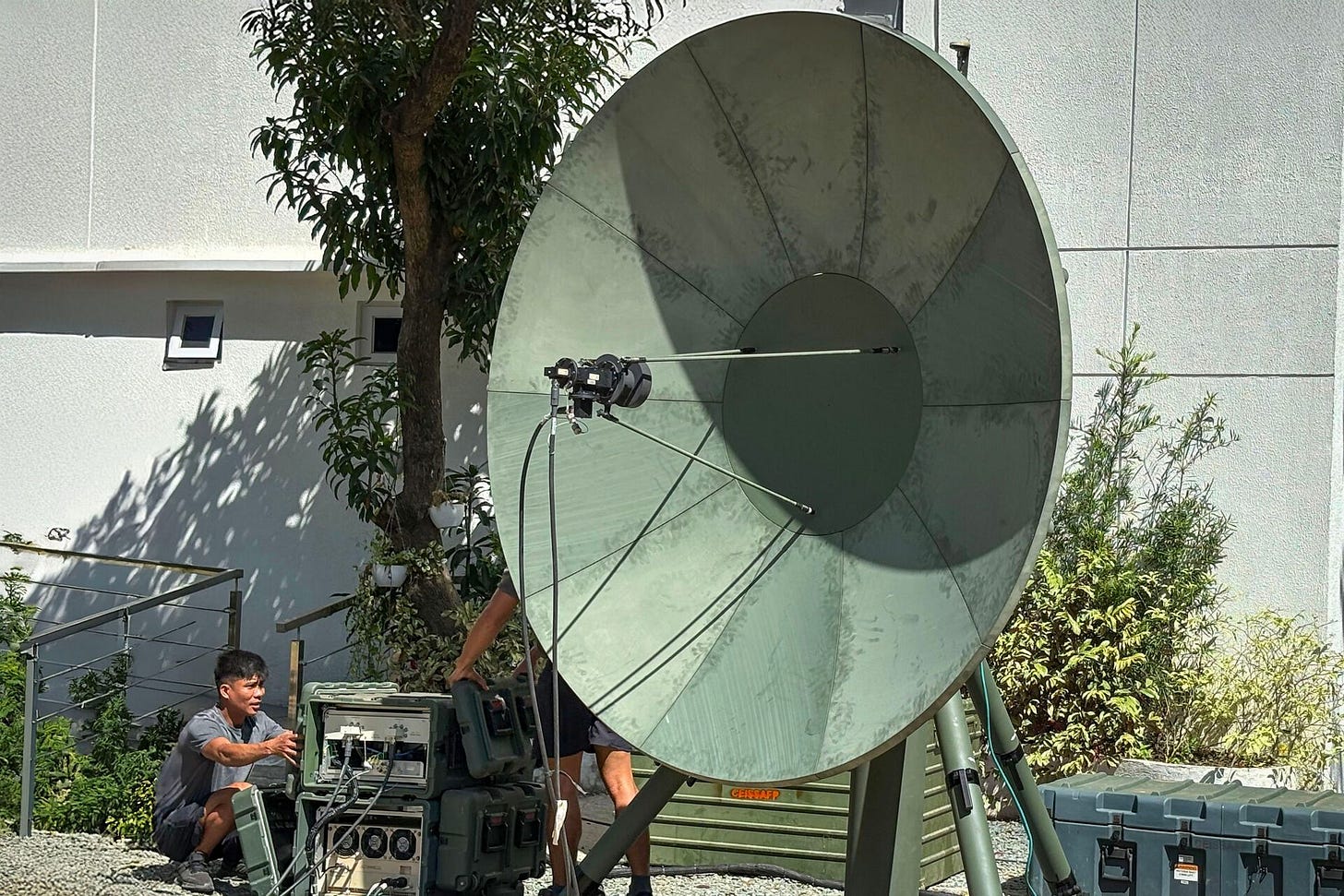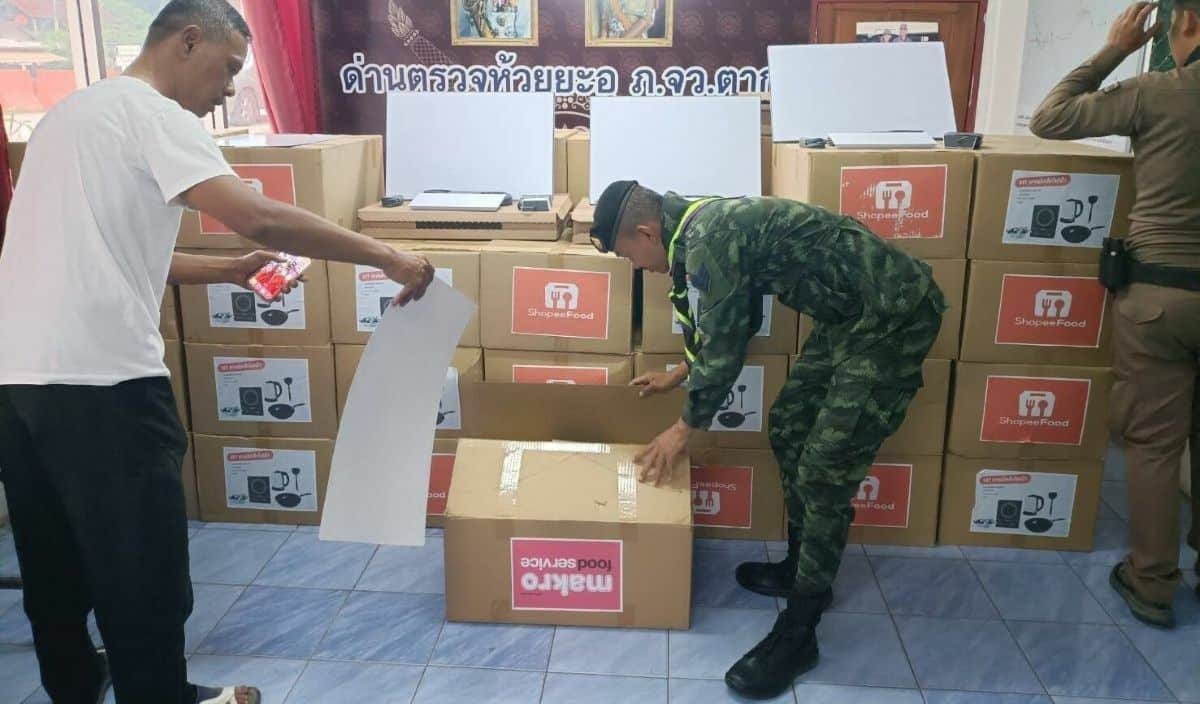Southeast Asia Space Roundup: 20 to 26 March 2025
A summary of all the space news in Southeast Asia over the past week, brought to you by AzurX
The following are the major space developments in the Southeast Asian region tracked by Southeast Asia Space Monitor over the past week:
Thailand Space Developments

Thailand’s NT & Eutelsat OneWeb Expected to Start Operations on 25 March 2025
Thailand’s state enterprise National Telecom (NT) and Eutelsat OneWeb are preparing to launch a low-Earth orbit (LEO) satellite broadband service for Southeast Asia, with operations expected to begin on 25 March 2025 via NT’s satellite gateway at the Sirindhorn Earth station. While international service has received regulatory approval under NT’s landing rights, local service provision remains under review by the Council of State and requires additional clearance from the National Broadcasting and Telecommunications Commission (NBTC). The $25 million joint infrastructure investment underscores the strategic importance of this partnership in delivering high-speed connectivity—up to 10 Gbps—across remote areas in Southeast and East Asia. Targeting enterprise clients, NT forecasts annual revenue of at least 200 million baht ($5.9 million), with plans to support over 50,000 regional users in the first year. However, concerns over legal and national security implications have led to a reevaluation of the partnership terms, reflecting the complexities of integrating foreign satellite services within domestic regulatory frameworks while ensuring long-term strategic and commercial interests.

Thailand and South Korea Deepen Space and Nuclear Energy Cooperation
Thailand and South Korea have signed a bilateral agreement to deepen cooperation in nuclear and advanced technology sectors, with significant emphasis on space collaboration. While the agreement primarily supports peaceful nuclear R&D and clean energy transitions through small modular reactors (SMRs), it also marks a strategic expansion of joint initiatives in space technology. Ambassador Park Yongmin highlighted ongoing efforts between Thailand’s Geo-Informatics and Space Technology Development Agency (GISTDA) and the Korea Aerospace Research Institute (KARI), including feasibility studies for a Thai spaceport and joint satellite development. The agreement further outlines enhanced collaboration between Thai agencies and the newly formed Korea AeroSpace Administration (KASA), reinforcing both countries’ commitment to advancing regional capabilities in satellite systems, space infrastructure, and technology exchange. This partnership positions Thailand to accelerate its ambitions in space science and satellite development through South Korea’s established aerospace expertise.
Thailand Authorities Seize 38 Starling SATCOM Terminals Bound for Myanmar Scam Call Center
Authorities in Thailand have intensified efforts to combat transnational cybercrime networks by intercepting a shipment of 38 Starlink satellite receivers allegedly being smuggled into Myanmar for use by a call center scam operation in Myawaddy, Karen State. The seizure, involving Thai military, police, and anti-narcotics units, highlights the growing misuse of satellite internet technology—specifically Starlink—to support illicit cross-border activities in regions where terrestrial networks are unavailable or monitored. This latest incident follows a similar interception earlier in March, where 21 Starlink devices and related equipment were confiscated en route to Payathonzu. These operations come amid a broader Thai government crackdown, which includes cutting power, fuel, and internet services to border areas, a move credited with reducing call scam losses by over 200 million baht ($5.9 million). The case underscores the dual-use nature of emerging satellite technologies and the mounting regulatory and security challenges they pose in fragile or poorly governed border zones across Southeast Asia.
Thailand’s GSTDA, India’s ISRO Deliver Satellite Data for ASEAN Food Security
Between 2020 and 2024, the Indian Space Research Organisation (ISRO), in collaboration with Japan’s JAXA and Thailand’s Geo-Informatics and Space Technology Development Agency (GISTDA), led a regional initiative under the Space Applications for Environment (SAFE) program to deliver validated satellite-based agrometeorological (Agromet) data to support Asia’s Rice Growing Outlook (RGO) activities. This multi-agency effort focused on enhancing food security by integrating satellite-derived metrics—such as Land Surface Temperature (LST), precipitation, and NDVI—with in-situ observations to monitor extreme weather events like floods and droughts. Through ISRO’s VEDAS portal, officials from nine ASEAN countries received targeted capacity-building training, enabling the operational use of Agromet data in national agricultural monitoring systems. The project has been recognized as a model of best practice in international reports by GEOGLAM and UN ESCAP, underscoring its role in advancing geospatial applications for sustainable agriculture and food security across the Asian region.
Philippines Space News
Kristine Atienza, From the Philippines, Completes Astronaut Training for Near-Space Mission
Kristine Atienza has become the first Filipino to complete training and certification for commercial suborbital spaceflight, marking a milestone not only for the Philippines but also for Southeast Asia’s growing engagement with human space exploration. Following her achievement in 2023 as the country's first analog astronaut, Atienza undertook a rigorous suborbital training program at the National AeroSpace Training and Research (NASTAR) Center in the United States, preparing her for the physical and technical demands of near-spaceflight, including exposure to high G-forces. Her journey reflects a growing aspiration within emerging space countries to participate in the commercial spaceflight sector, and she continues to use her platform to advocate for the development of a Philippine human spaceflight program. Atienza’s efforts underscore the importance of capacity building and regional representation in the expanding commercial space industry, with her training serving as both a symbolic and practical step toward enabling future Southeast Asian astronauts to breach the Karman line.
Converge ICT Solutions & Starlink Partner to Provide LEO SATCOM in the Philippines
Converge ICT Solutions has entered into a strategic partnership with Starlink to deliver satellite-based internet services to remote and underserved regions in the Philippines, targeting sectors such as agriculture, mining, fisheries, construction, and maritime hospitality. As an authorized Starlink reseller, Converge will provide end-to-end solutions including installation, maintenance, and network management, while also bundling Starlink’s satellite capabilities with its own fiber infrastructure to ensure service redundancy. This initiative is expected to boost Converge’s enterprise segment by 5–10% this year. Concurrently, Converge has partnered with U.S.-based Ribbon Communications to integrate AI-enabled data transmission into its nationwide fiber network, enhancing capacity and resilience to meet rising digital demands. These collaborations have been welcomed by the U.S. Embassy, which sees them as a catalyst for increased American investment in the Philippines, particularly in defense and the BPO sector, by reinforcing secure and reliable digital infrastructure.

Armed Forces of the Philippines Start Training on Satellite-Resilient MRRS Communications System
Spectra Group (UK) Ltd. has launched a comprehensive training initiative for the Armed Forces of the Philippines (AFP) to operationalize the Modular Transportable Transmission System (MTTS), a resilient, high-bandwidth communication platform developed by Comtech and optimized for austere environments. This move, part of Spectra’s broader Asia-Pacific expansion and supported by its new Australian office, reinforces the company’s commitment to enhancing strategic communications across the region. Utilizing troposcatter technology, which bypasses reliance on satellites or GNSS infrastructure, MTTS enables secure voice, data, and video transmissions even amid electromagnetic disruptions or natural disasters—a critical capability for the archipelagic and topographically complex Philippines. The $25 million infrastructure investment by Eutelsat OneWeb and NT, as well as Spectra’s in-depth AFP training program, positions the Philippines to maintain operational independence across military, humanitarian, and disaster response scenarios. The MTTS is central to the AFP’s modernization drive, bolstering inter-service coordination and ensuring continuity in contested environments such as the South China Sea. Spectra’s sustained engagement goes beyond equipment provision, equipping the AFP with scalable, autonomous communications solutions fit for 21st-century security challenges.

Philippine Space Agency to Provide Satellite Data & Training to National Mapping Authority
The Philippine Space Agency (PhilSA) and the National Mapping and Resource Information Authority (NAMRIA) have formalized a strategic partnership to enhance the country's geospatial intelligence capabilities through the use of satellite data and advanced remote sensing technologies. Signed on 10 February 2025, the Memorandum of Agreement establishes a framework for joint research and development in land cover, topographic, and bathymetric mapping, as well as environmental monitoring and natural resource management. PhilSA will provide technical training and support to strengthen NAMRIA’s capacity in satellite imagery processing and analysis, enabling the integration of space-based tools into national decision-making frameworks. This collaboration builds on prior joint initiatives and reflects a shared commitment to using space technology to address climate change, promote biodiversity conservation, and support evidence-based policy. The partnership marks a significant step in operationalizing the Philippines’ space assets for sustainable development and environmental resilience.
Vietnam Space Developments

Vietnam Ministry Formally Proposes Approval for Starlink SATCOM Pilot Program
Vietnam’s Ministry of Science and Technology has formally proposed government approval for SpaceX's Starlink satellite internet services, marking a significant step toward integrating foreign-owned satellite communications infrastructure into the country’s digital ecosystem. Enabled by a recent National Assembly resolution allowing 100% foreign ownership, the move aligns with Vietnam’s broader legislative reforms aimed at advancing science, technology, and digital transformation. Prime Minister Pham Minh Chinh has instructed authorities to expedite pilot licensing, following high-level engagements with SpaceX and U.S. business leaders. With SpaceX planning up to $1.5 billion in investment, Starlink's entry could significantly enhance internet connectivity in underserved regions while reinforcing Vietnam’s position as a rising hub for high-tech foreign direct investment and satellite-enabled digital services.
Vietnam Emerging as Supply Chain Hub for SpaceX and its Suppliers
Vietnam is rapidly establishing itself as a strategic hub for high-tech investment, with SpaceX and its suppliers committing over US$1.5 billion to satellite internet infrastructure and advanced manufacturing, signaling a significant shift in global supply chains. Central to this expansion is SpaceX’s Starlink service, aimed at addressing connectivity gaps in remote areas, aligning with Vietnam’s national digital transformation agenda. Supported by evolving regulatory frameworks—including new pilot schemes allowing foreign control of LEO satellite services and requirements for local gateway stations—Vietnam is positioning itself to attract major space and telecom players. Suppliers like Wistron NeWeb are expanding production capacities in Vietnam, reinforcing the country’s role in Starlink’s hardware ecosystem and contributing to job creation and technology transfer. While regulatory hurdles and supply chain dependencies remain, Vietnam's favorable investment climate, geographic advantage, and digital infrastructure growth underpin its ascent as a key player in aerospace, AI-powered telecommunications, and satellite internet deployment across Southeast Asia.
Indonesia Space News

Indonesia at Center of Failed Satellite Project Arbitration and Litigation
The ongoing legal dispute between Indonesia’s Defense Ministry and Liechtenstein-based Navayo International AG over a failed satellite project underscores the critical need for stronger contract governance and dispute resolution mechanisms in foreign technology deals, particularly those involving strategic sectors like space. Following a 2016 contract cancellation, Navayo secured a $24.1 million arbitration award from a Singapore tribunal, now accruing daily penalties, after Indonesia failed to pay a $16 million bill. Chief Legal Affairs Minister Yusril Ihza Mahendra criticized the use of international arbitration in state contracts, warning that such clauses weaken Indonesia’s legal standing and national sovereignty. The case has escalated with French courts approving the seizure of Indonesian diplomatic assets in Paris, prompting Jakarta to pursue diplomatic remedies and possible corruption charges against Navayo, which allegedly delivered only a fraction of the contracted work. The incident, which also involves a similar arbitration clause in a separate Airbus satellite agreement, has triggered a broader policy response, with Yusril urging ministries to consult the Attorney General’s Office before finalizing contracts with foreign entities. The case highlights the strategic and legal vulnerabilities states face when engaging in space and satellite partnerships without rigorous legal safeguards.
More Details Emerge on Indonesia’s Talks With Amazon’s Project Kuiper
Amazon’s Project Kuiper is advancing its global low-Earth orbit (LEO) satellite ambitions with plans to invest an initial $20 million to build six gateway stations in Indonesia, signaling a direct challenge to Starlink in the region’s growing satellite broadband market. With potential expansion to $90 million by 2035, the move aligns with Indonesia’s push to bridge the digital divide in remote and underserved areas. Amazon has applied for key operational permits, including telecom licenses and satellite leasing rights, leveraging new regulations that permit foreign entities to operate via a Business Identification Number (NIB). The Indonesian government, emphasizing the role of satellite technology in supporting MSMEs and public services such as e-health, e-education, and e-government, has pledged regulatory support to accelerate the project’s deployment. Project Kuiper’s local engagement strategy reflects broader geopolitical and commercial dynamics in the LEO sector, as major players race to establish infrastructure footholds in key emerging markets across Southeast Asia.
Other Regional Space Developments

Myanmar-Russia Space Cooperation Includes Potential Development of a Satellite Launch Site
Myanmar’s high-level engagement with Russia, led by Senior General Min Aung Hlaing during his recent visit, marks a strategic step toward advancing the country’s peaceful space ambitions through collaboration with Roscosmos. The bilateral discussions emphasized joint initiatives in satellite technology, rocket manufacturing, and scientific training, with the establishment of a Roscosmos office in Myanmar and potential development of a satellite launch site in the Tanintharyi Region. This partnership is positioned to enhance Myanmar’s capabilities in communication, disaster management, and agricultural planning, while also fostering education, industrial growth, and regional integration. By aligning with international norms on peaceful space use, the alliance aims to build a knowledge-based economy and elevate Myanmar’s role in Southeast Asia’s emerging space ecosystem. However, realizing these ambitions will require overcoming significant infrastructure and governance challenges, ensuring equitable access to the benefits of space technology, and maintaining transparency in a complex geopolitical environment.

Papua New Guinea Mulls Space Agency & National Satellite Amidst Controversy from Australia
Papua New Guinea’s national cabinet is under scrutiny following its decision to fast-track an ambitious development agenda that includes the creation of a national space agency and government-owned Kumul Satellite Project. Part of a broader 70-project initiative marking the country’s 50th year of independence, the space-related plans aim to position PNG within the satellite and space technology domain, with oversight mechanisms reportedly assessed by KPMG. The government argues that the space agency is necessary to manage its proposed satellite infrastructure, but critics warn that such ventures are fiscally irresponsible given PNG’s reliance on over $3 billion in Australian budget support and its ongoing struggles with essential public services. Analysts and local stakeholders have labeled the satellite initiative—alongside other high-tech proposals such as post-quantum cryptography and a Silicon Valley-style hub—as unrealistic and investor-driven, potentially diverting scarce resources away from critical sectors like healthcare and education. While officials assert that most projects are intended for private sector execution with minimal direct funding, the satellite program underscores PNG’s aspiration to participate in the strategic space economy despite domestic economic constraints and mounting skepticism.
Singapore-Based Researcher Publishes Study on Global Space Public-Private Partnerships
Researcher Wichuta Teeratanabodee, writing for the S. Rajaratnam School of International Studies (RSIS) at the Nanyang Technological University in Singapore, argues that the global space sector has undergone a significant transformation since the Cold War, driven by the rapid commercialization of space and the increasing reliance on public-private partnerships (PPPs) to enhance both civilian and military capabilities. A comparative analysis of spacefaring nations—including the U.S., UK, Russia, Japan, India, and China—reveals diverse PPP models shaped by differing regulatory maturity and institutional experience. While Western countries exhibit more advanced PPP frameworks, emerging space powers are still refining their models. However, a common challenge across all jurisdictions is the slow development of robust domestic regulations to govern these partnerships. This regulatory lag raises concerns about oversight, especially as private entities gain greater influence in space activities. Furthermore, despite growing international discourse on space safety and sustainability, national legal systems have yet to fully integrate these principles, underscoring the urgent need for more comprehensive governance structures to manage the evolving risks and responsibilities in the expanding space economy.
Be sure to catch up with space activities in the region in the next edition of Southeast Asia Space Monitor’s space roundup!





